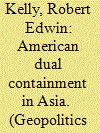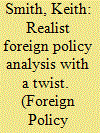| Srl | Item |
| 1 |
ID:
101104


|
|
|
|
|
| Publication |
2010.
|
| Summary/Abstract |
US grand strategy after 9/11 turned from post-containment drift to preemption. But the costs are high - suspicion of American power, hedging by traditional allies, expensive, go-it-alone ventures like Iraq. Tried-and-true containment better reflects American values. While forward in the world, containment is also defensive. It reassures skittish partners and reflects liberal, anti-imperial US preferences. In Asia, containment would deter the primary contemporary challengers of US power - radical Islam and Chinese nationalism - without encouraging a Bush-style global backlash. In a reductive analysis of US alliance choices, this article predicts a medium-term Indo-American alliance. India uniquely shares both US liberal democratic values and the same two challengers; it is the likely pivot in a US-backed neo-containment architecture in Asia.
|
|
|
|
|
|
|
|
|
|
|
|
|
|
|
|
| 2 |
ID:
146342


|
|
|
|
|
| Summary/Abstract |
Analyses of US post-Cold War foreign policy in the Persian Gulf symbolize realism's new found concern with foreign policy analysis. Prominent realists attribute specific policies to domestic concerns and how they have dominated policymaking in the era of US primacy. Although convincing, this perspective is not comprehensive. By drawing on regional security complex theory, it is possible to map the regional developments that have equally constrained and incentivized the rise and fall of dual containment. This more extensive account produces two important findings regarding realism's neglect of the regional level of analysis. First, realists overstate the domestic determinants of US policy in the Persian Gulf. Second, and more broadly, realist foreign policy analysts underspecify systemic pressures that shape and shove a country's foreign policy.
|
|
|
|
|
|
|
|
|
|
|
|
|
|
|
|